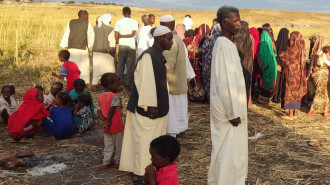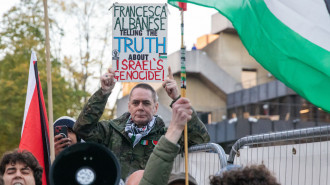'Kafala is slavery': Protesters march for domestic workers' rights in Lebanon
The demonstrators gathered at Dora Roundabout at 3pm to march to Sin el-Fil, a suburb east of Beirut, in protest of the supposed inaction by police and the Lebanese government in protecting the rights of domestic workers, who face increasing abuse by employers and recruitment agencies.
This is the ninth year in a row that people of all ethnicities, majority of whom are Sri Lankan and Ethiopian, have gathered to protest the mistreatment of domestic workers.
But according to some people, things have only become worse.
The protesters demanded an end to the Kafala, or sponsorship, system, and for it to be replaced by a new system that guarantees workers the right to resign from their job, legally remain in Lebanese territory and be able to seek alternative employment.
The Kafala system is a sponsorship system the requires workers to have in-country sponsors that oversee their visa as well as legal status.
This system has been criticised by many human rights organisations as it gives the employer the ability to abuse their employees and to control their wages without any fear of repercussion as the employer could revoke the worker's legal status and force them to be deported.
 |
Everywhere they are abusing us because they think that the ladies, the domestic workers, are all prostitutes. We are not prostitutes! |  |
They also called for the government to step in and protect the rights of workers, to stop the abuse by employers and called for an end to the exploitation by various recruitment agencies due to the Kafala system.
They also wanted Lebanon to ratify the International Labour Organisation Convention 189. This convention set out to define who is a domestic worker and what rights domestic workers should have. Any government that ratifies this convention should work to protect their rights, but Lebanon has yet to ratify the convention.
Some people held signs that said "We are not criminals" in English, while most others held signs in Arabic. Many people were also wearing shirts that said "Kafala is slavery" in English.
 |
|
| The protesters demanded an end to the Kafala system [Nicholas Frakes] |
During the march, one domestic worker was trying to take a picture, but a police officer immediately grabbed her by her hand and told her that she was not allowed to take any photographs.
They then tried to detain her, but all the protesters sat on the ground so that the marcher's lawyer could pass through the crowd and resolve the situation.
Read also: Syrian refugees balance safety and hardship in Lebanon
The march ended in al-Sayda garden in Sin el-Fil where protesters danced and gave speeches against the Kafala system, calling for more rights and protection from their employers.
 |
We are a human being like you, like everybody. So why are we facing all these problems? |  |
Tanya, from Sri Lanka, said: "Please. I'm asking from everyone, we are a human being like you, like everybody. So why are we facing all these problems? So, please, we want our freedom. We are not going to fight to take anything back to our country.
"I'm asking to not abuse us in public areas, especially in transport. Everywhere they are abusing us because they think that the ladies, the domestic workers, are all prostitutes. We are not prostitutes!"
Abed, from Syria, argued that they need to start fighting and asking for their rights.
He said: "We need to start from the houses that we work in. From the places we work at, every year we are given a chance to have a break to go public and to speak out.
"Now this protest is going to end, and all of us are going back to the houses where we belong, to our jobs, this is where the real fight is. This is where either you obtain your rights, or you don't."
Despite the passionate calls for rights and the loud cheers of support, some people were not very optimistic that anything would change, with one man commenting that they were marching today only to go back to work and face the same abuses tomorrow.
Nicholas Frakes is a freelance journalist who reports from London, the Middle East and North Africa.
Follow him on Twitter: @nic_frakes





 Follow the Middle East's top stories in English at The New Arab on Google News
Follow the Middle East's top stories in English at The New Arab on Google News


